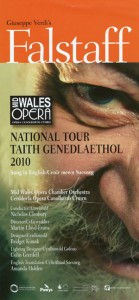Translating Falstaff

On a snowy night in February 1987 I went to see Graham Vick’s Birmingham opera company performing La bohème (in English) at the Derngate Theatre in Northampton. There wasn’t much time before my train home but I nipped round to the stage door to congratulate the conductor. He was in a hurry too and said ‘Thanks, must rush’, but as I retreated he called me back; ‘Hang on a mo’, do you know Falstaff?’….
Translating Falstaff for that company was one of the best revelations of my professional life. My old Fischer-Dieskau LPs of Falstaff were soon whirling continuously – I needed to absorb all the music before I could begin to fit new words to it – and then, after drafting the translation, which took me about four months, I had the great chance of working through it with the director and of honing it in stage rehearsals with a terrific group of singers – the best possible way to tailor a new translation. Collaborative work is so rewarding – I’m eternally grateful to all singers whose brilliant ideas I have purloined over the years. But what was revelatory was getting to know this miraculous work which undoubtedly has one of the richest of all librettos in the operatic canon.
In the last 40 years, a combination of the jet engine (bringing non-English speaking singers here from abroad) and sur-titles has changed the way we perceive opera words so much that I often feel that the text is no longer something anyone really bothers to listen to. This is very hard on singers. All composers write in the language of their audience; before Falstaff was premiered in Paris and London, Verdi himself commissioned French and English translations for those performances. Thus, on 19 May 1894 Falstaff received it’s UK premiere at Covent Garden in a translation by a now forgotten librettist and translator, William Beatty Kingston.
Often feeling like an aunt sally amidst the controversies surrounding Opera in English, I reckon Falstaff offers the finest example of a libretto that positively revels in being performed in the language of the audience. Of course it also has a local link for us, being based on Shakespeare and set in Windsor, but what you lose from not hearing the Italian you gain in immediacy and understanding, and – vitally – there is a clear line of communication from the singer to you. And surely if Verdi wanted you to hear every word he wouldn’t have written (e.g.) a fast nonet with nine different rhyming texts in Act I, Part II. Here, it doesn’t matter that the audience will only catch snippets of text, but it is essential that the singers totally empathize with what they are singing about.
Boito’s Italian libretto doesn’t actually include any direct quotes from its sources which are, Henry IV Parts I & II, and The Merry Wives of Windsor. he himself worked from Italian translations of Shakespeare and I have no idea if he knew any English. But what he did was fashion a libretto suitable for Verdi’s needs while remaining utterly faithful to the spirit of the original creator. Though it is a fascinating exercise, it is slightly unnecessary to know which words he used and from where they come since there are very few direct quotes. But the libretto emerges with the image of the fat knight intact and the plot close to that of The Merry Wives, though one of the practial jokes is missing – this Falstaff doesn’t dress as a washerwoman; perhaps Verdi thought his Sir John a little too dignified for that.
As you listen to this glorious piece, I hope you can allow it to speak/sing directly from its heart to yours. Its last words sum it up perfectly:
Tutto nel mondo e burla, literally, The whole world is a joke, but how about
‘Life is a burst of laughter…’?!
this article appeared in the programme for Mid Wales Opera’s 2010 production of Falstaff